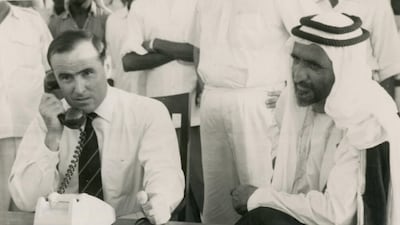Fifty years ago, a telephone call took place that was perhaps the most important in local telecommunication history.
The date was January 31, 1974. Sheikh Zayed bin Sultan Al Nahyan, the Founding Father of the UAE, who at the time was President of the UAE and Ruler of Abu Dhabi, spoke on the phone to Sheikh Rashid bin Saeed Al Maktoum, Ruler of Dubai.
The telephone call officially inaugurated a direct telephone service between Abu Dhabi and Dubai. Taking place just over two years after the formation of the United Arab Emirates, the phone call was the foundation of a national telecommunication service that set out to be the equal of the world’s finest.

Two years after that phone call, the Emirates Telecommunications Corporation, better known as Etisalat, was founded with its headquarters in Abu Dhabi. The state-owned group would be the exclusive provider of telecommunication services in the country for the next three decades. Its office buildings spread across the UAE and were notable for the golf ball-like spheres that crowned the structures.
In 1982 it launched the Middle East’s first mobile network. The feat would be one of many firsts as just over a decade later, it would again be a forerunner of the second-generation digital cellular network GSM, and in 1995 it became the region’s first to introduce internet services. That same year, it opened its sim-card factory. By the turn of the century, Etisalat would have more than one million subscribers to its mobile data service. The number represented about a third of the country’s population at the time. These accomplishments, in retrospect, signalled Etisalat’s ambition to be a leading regional player, and today the group has services extending to 16 countries throughout Asia, Africa and the Middle East, catering to a whopping 155.4 million subscribers.
In 2007, another telecommunications group entered the local market, effectively ending Etisalat’s monopoly in the country. Between du and Etisalat, the local internet and telephone services gained traction to stay up to date with global technologies. Most recently was the 5G revolution, with the technology becoming available in the UAE in 2019. The UAE thus became the first in the Arab region and fourth globally to introduce and use the fifth-generation cellular wireless network.
Over the past few years, the UAE has consistently been named as one of the world’s most connected countries. A 2023 factsheet by the Telecommunications and Digital Government Regulatory Authority provides some insight into this. According to the government body, more that 99 per cent of the country’s population are internet users, accessing the web with everything from smartphones and computers to gaming consoles, smartwatches and VR headsets.
To consider that in a period of 50 years the UAE has gone from a telephone conversation between leaders in two emirates to having its entire population plugged in to the latest telecommunication technology illustrates the country’s advances perhaps better than most other examples.


